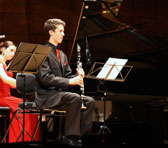27 April 2011
Australian Music in the VCE
 Image: Leighton H. Triplow, in a performance of his chamber work ‘Exit 7’ at Top Class Sound, Melbourne Recital Centre in March 2011
Image: Leighton H. Triplow, in a performance of his chamber work ‘Exit 7’ at Top Class Sound, Melbourne Recital Centre in March 2011 [Update February 2017 - VCAA links in this article have now been updated - please refer to the VCAA website for up-to-date information regarding repertoire lists and other information]
VCE Music is a 10-unit study in the Victorian Certificate of Education. Students can undertake any or all of the units focusing on performance, creating original works through composing or improvising and/or study of music works. The VCE syllabus has recently changed to include a bigger Australian focus - we asked Curriculum Manager Helen Champion to explain the various units of the VCE. The study and supporting documentation is available from the VCAA website. See also the range of teacher resources available on the AMC website, and the repertoire navigator.
Performance repertoire
Works by Australian composers are included in all the Prescribed lists used to select Unit 3-4 (year 12) repertoire. There are lists for 40 solo instruments from accordion, bagpipes, recorder, through orchestral, keyboard, fretted string, percussion, contemporary and band instruments, to voice (classical and voice contemporary popular) and a list of group works organised by music style and ensemble type. Students who play instruments for which there isn't a list can apply to have their program approved. In recent years performers of balalaika, saz, tabla, koto, mallet percussion and a taiko/flute ensemble have presented programs. A feature of many approved programs is the inclusion of original works created by Australian composers, reflecting a dynamic music culture within these students' communities. Original works created by students can also be approved for performance.
Lists are reviewed regularly and composers are invited to submit works for consideration to the Curriculum Manager by email
Music Performance Units 1-4
These units include three interrelated areas of study - Performance, Performance technique and Musicianship. As performers, students consider how to develop informed interpretations of their works and develop relevant technical skills. This is supported through study of 'interpretation' in the Musicianship area of study where students analyse ways in which expressive outcomes are realised in performance. They also analyse interpretive decisions evident in performances considering interpretation of elements of music and how the performers have created character in the performance. The source material for this study is Australian music created since 1910 and performed by Australians.
Music Investigation Units 3-4
Introduced in 2011, these units provide a pathway for students interested in composition/improvisation and performance. Students select and investigate an area of interest, or Focus Area, present a performance program to demonstrate their understanding of the area and compose, improvise or arrange a work that is characteristic of the area. In 2011 students have selected a diverse range of focus areas including a number looking at Australian works for specific instruments.
Music Style and Composition Units 1-4
These units involve study of music from diverse times and places and the creation of original works. The study offers an opportunity for students to complete a VCE music study at the highest level focusing on creating and analysing music rather than performance. Unit 3 students must study an Australian work. Many schools select Australian works for study across Units 1-4.
Concerts
Works created by VCE Music students are performed each year in Top Class Sound and Top Acts. Part of the VCE Season of Excellence, Top Class Sound features works created for VCE studies - usually Music Style and Composition, Music Performance and original film scores created for Media. 14 works written for chamber ensemble, rock group, jazz ensemble, symphonic band, orchestra and a cappella vocal group were presented at the Melbourne Recital Centre in March this year. All that is Gold, written by Elana de Gleria Clark for the Blackburn High School Orchestra will be performed as part of the Young Composers Project at the ASME conference in July.
Top Acts features performances from Dance, Drama, Music and Theatre Studies. In this year's Top Acts on May 13 at the Palais Theatre two compositions from Top Sound are included in the program - Exit 7 for flute, clarinet, cello and piano by Leighton Triplow (Victorian College of the Arts Secondary School) and Epilogue, a work for guitar, piano, bass and drums by Chris Bates, Nick Hall and Ben Zagroon (Preshil - The Margaret Lyttle Memorial School).
For further information about VCE Music, please contact Helen Champion, Curriculum Manager, Performing Arts at VCAA, tel. (03) 9651 4668 or email
Further links
Victorian Certificate of Education - VCE
studies
Resources
for teachers - AMC
© Australian Music Centre (2011) — Permission must be obtained from the AMC if you wish to reproduce this article either online or in print.
Helen Champion is the Curriculum Manager, Performing Arts at Victorian Curriculum and Assessment Authority (VCAA).
Comments
Be the first to share add your thoughts and opinions in response to this article.
You must login to post a comment.